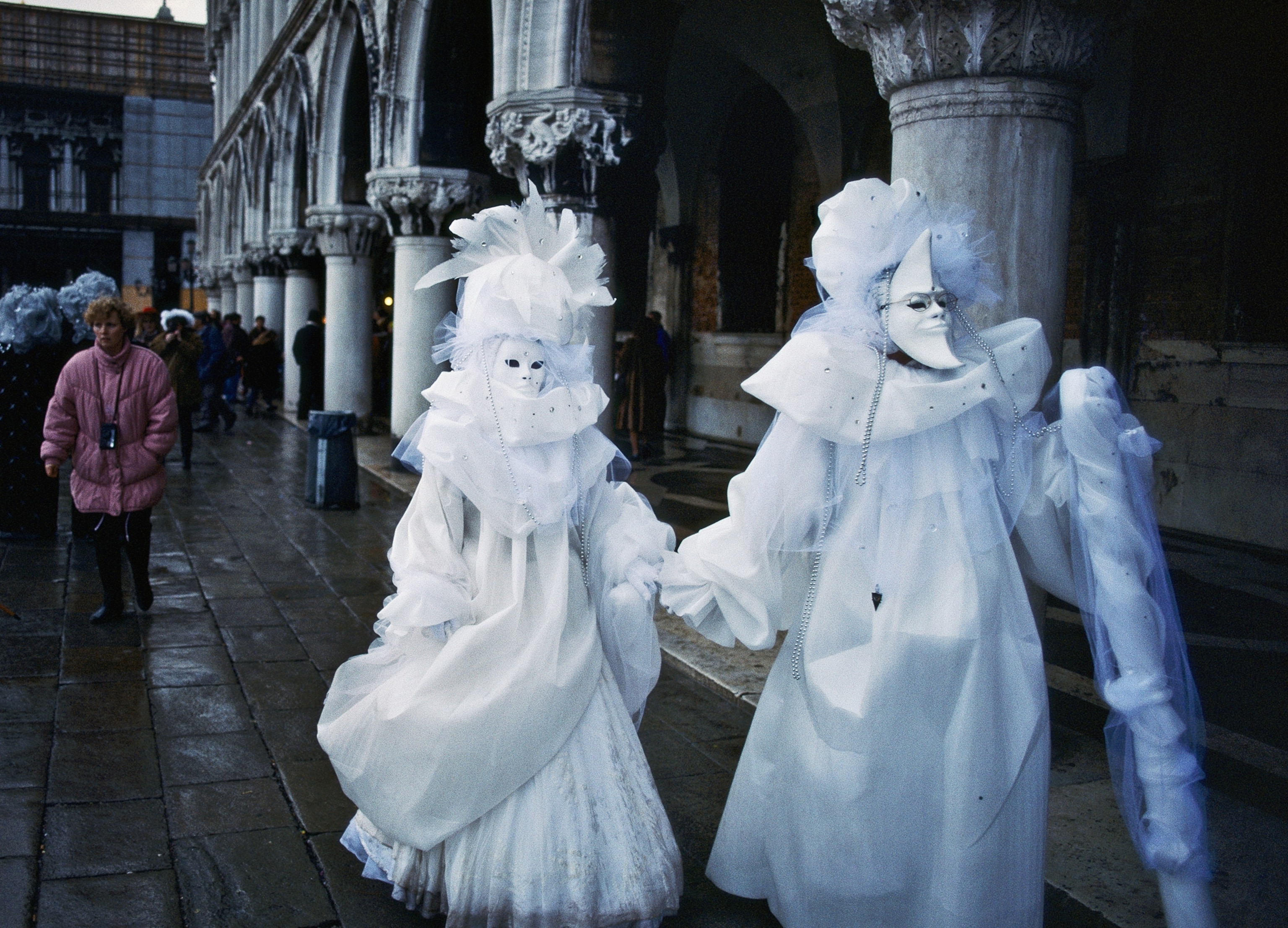
Venice Matters to History—Venetians Matter to Me
The World Heritage site is really just a classic small town, says author.
In our series My Town, writers and photographers from around the world reflect on places that hold special meaning for them.
Living in Venice is like being married to Cary Grant.
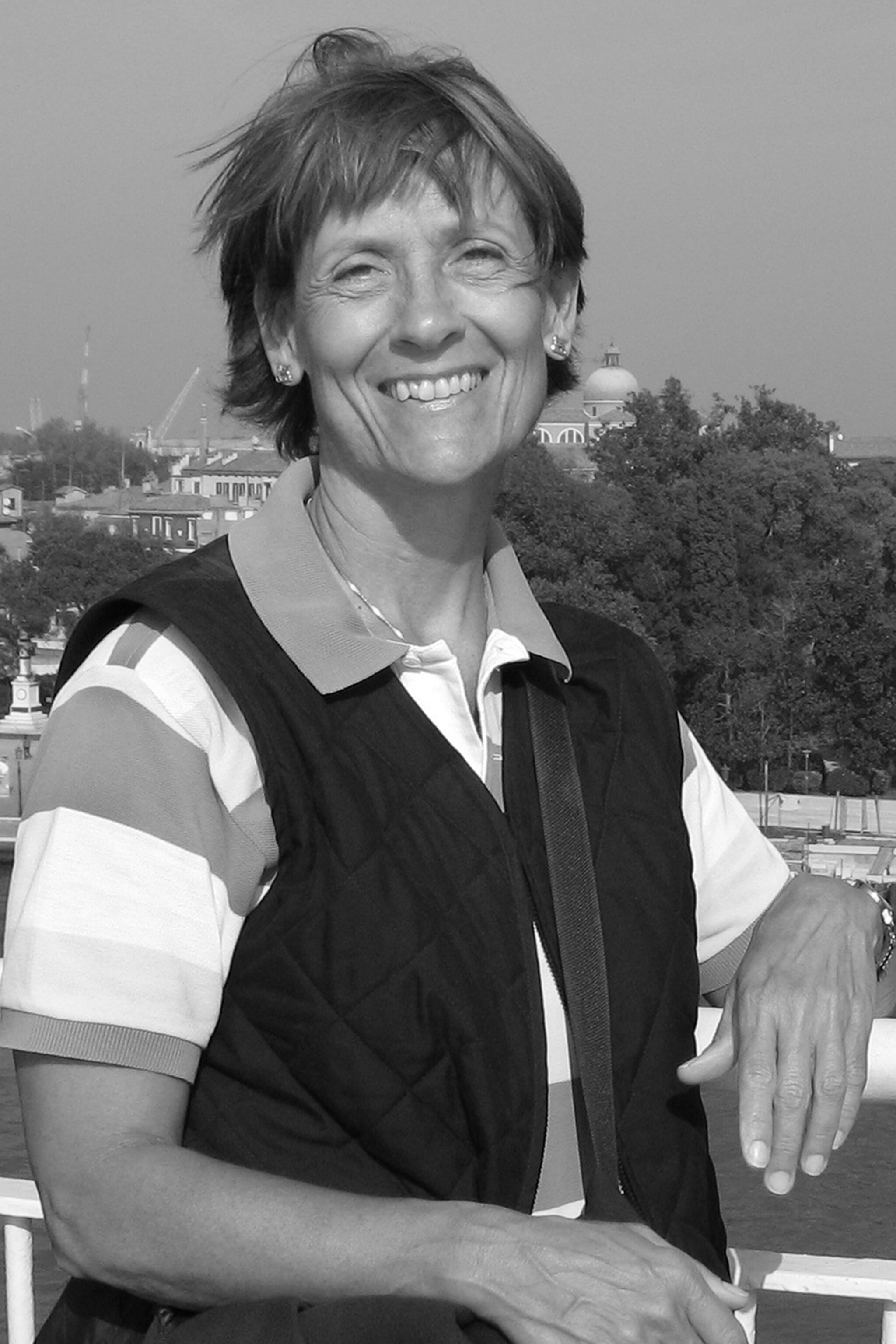
By which I mean that every day Mrs. Grant must have heard some dazzled admirer enthuse, "Oh, it must be so wonderful, what's he really like?" and because—there having been five Mrs. Grants—it clearly didn't turn out the way she had imagined it.
I often hear the same thing. "You live in Venice?" people say to me. "Oh, it must be wonderful!" And to keep it simple, I usually say, yes, it is, but I don't usually say that it's wonderful in ways that a visitor (the average stay is 1.5 days, and the majority are only a few hours) could ever discover.
Living in Venice is as arduous, surprising, frustrating, and rewarding as any marriage, though no newlywed believes that life with the beloved will ever be less than perfect, and no one with a crush on Venice ever wants to hear that it leaves its wet towels on the bathroom floor.
I fell in love with Venice in 1985, on vacation. But I didn't want the honeymoon to last forever—I wanted to know the Venice of the Venetians.
So I came back in 1994 on assignment for National Geographic to write about precisely that: the everyday Venice that lives amid the palaces and the postcards. (See photographs from National Geographic's February 1995 story "Venice, More Than a Dream.") And when I met Lino, who became my Venetian husband, I passed through what I think of as the secret door and found myself in what is essentially a small town in Ohio. With palaces and postcards.
If you've never lived in a small town, by all means come and give it a try. If you grew up in a small town and swore never to return, you should consider moving to Mexico City instead, because you'll never be happy here.
The World's Most Misunderstood City?
To begin with, Venice really is small. It covers a mere three square miles, but it's denser than osmium, composed of ponderous masses of old buildings separated by 182 canals on 126 tiny islands connected by 435 bridges and God knows how many tiny, twisty streets. Its phenomenal importance to world history and to Western culture is out of all proportion to its miniature dimensions.
Most visitors don't know much about the history, but Venice's strange, complicated, unfathomable beauty exerts a sort of ruthless enchantment. Millions have succumbed to it, and there is no known antidote. The beauty seeps into you through your pores while you're sleeping, while you're hauling the bags of groceries home.
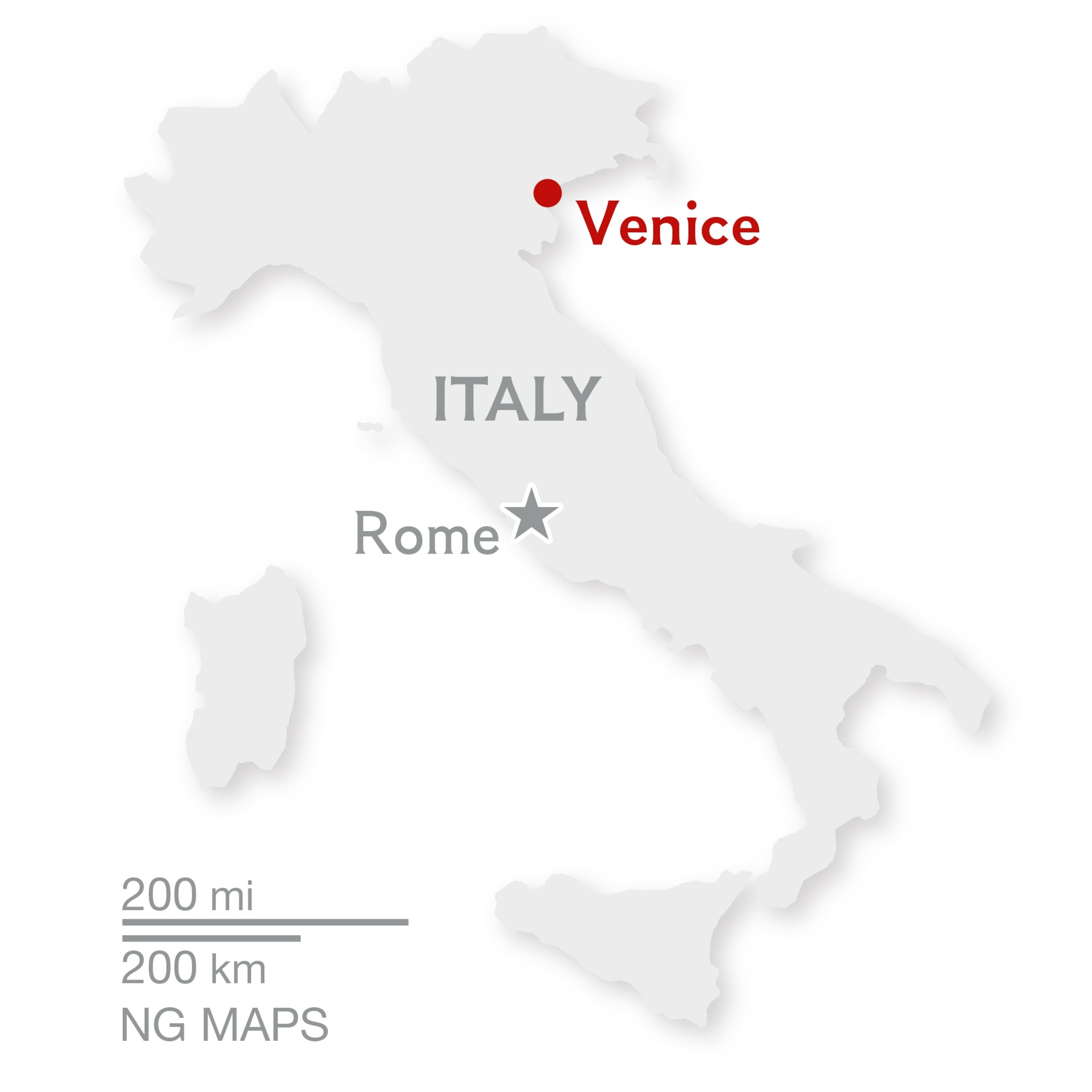
Lino has lived here all his life, yet even he can still have flashes: "This city is magic," I've heard him say in a choked voice. "Magic."
But as modern life marches on, the city has become too small for everyone who wants to visit it and too broke to support itself. At the moment, it's limping along under the care of a federally appointed administrator because the entire city government collapsed in June under the accumulated weight of years of staggering corruption.
If the appalling quantity of tourists and capricious inefficiency of public services and spectacular incompetence of the city government and the deterioration of more or less everything don't dim the city's luster, it's probably undimmable. (Read "Vanishing Venice" in National Geographic magazine.)
I knew there was no hope for me the day I realized I'd rather be unhappy here than happy somewhere else. That's pathetic.
I believe you can't really know Venice if you don't live here, because the city you can see in a few days, or even weeks, and especially the city you read about in the press, is almost nothing like the reality.
For at least a millennium, visitors didn't have many misconceptions about the city. But now so many weird, fantastical things are said—and repeated—about Venice that I think it must be the most misunderstood city on Earth, including all the places that call themselves "The Venice Of."
Metric tons of misinformation come out every year in foreign and even Italian media. I can't understand why these wild statements are made. Is it the effect of mass tourism? Mass media? Is it because Venice is so peculiar that anything could be true? As they say in Italian, "Mi fa diventar matta"—"It makes me to become crazy."
Let me readjust two of the most common ideas about Venice that daily life shows are unrelated to reality.
False
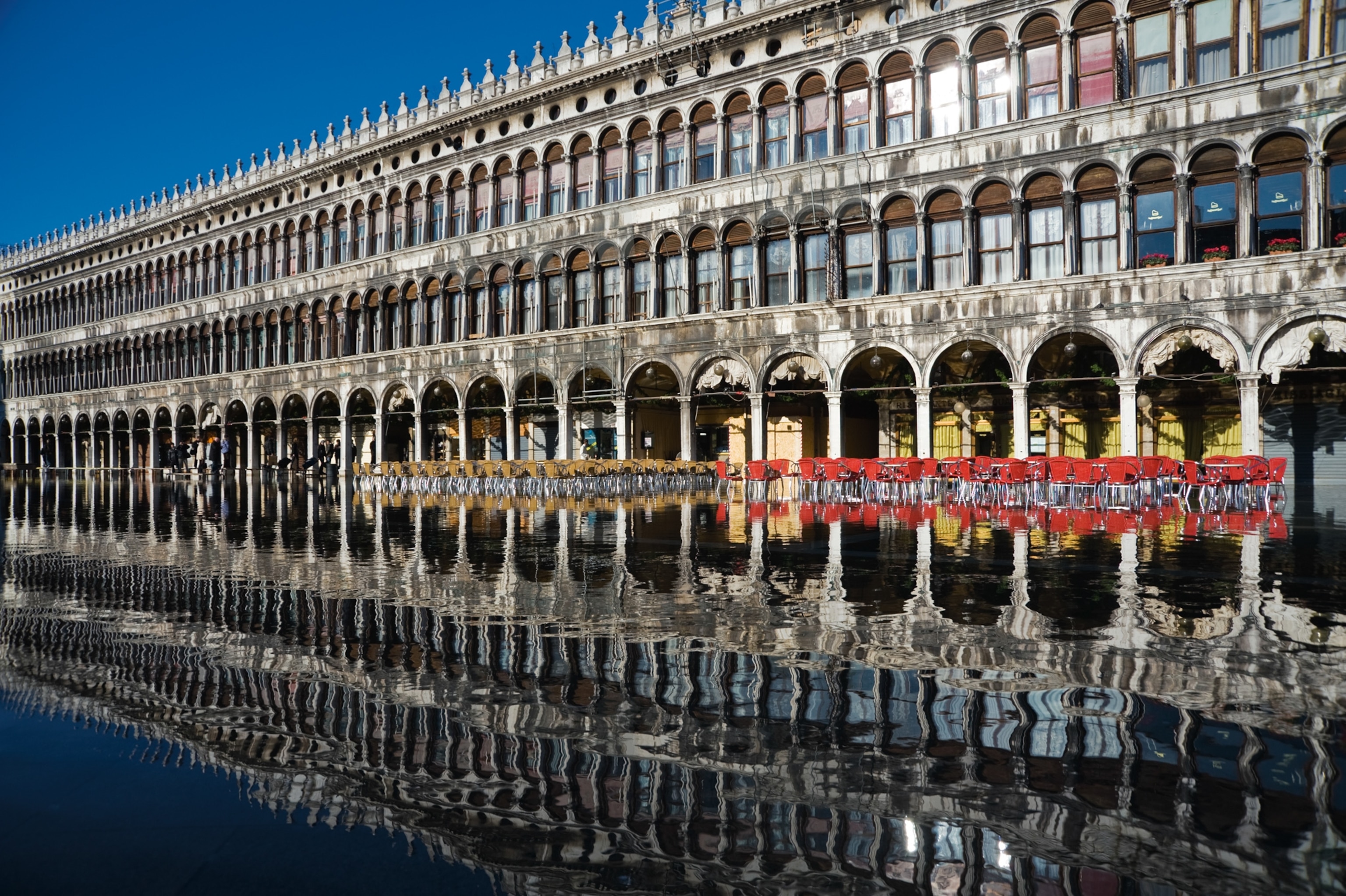
Venice is drowning! Every year, stories, and especially photographs, are printed that give the impression that we live our lives with water lapping at the bookcases. We don't. We live half the year, maybe more, without even the memory of acqua alta, or high water, our wellies gathering dust in the broom closet.
In any case, when we do have high water, it lasts only a few hours, because it is a tidal phenomenon. Six hours in, six hours out. Hardly the apocalypse.
Furthermore, Venice doesn't float like a lily pad on the surface of the water. A moderate high tide of up to 110 centimeters (three and a half feet above median sea level) dampens a mere 14 percent of the city. Instead of showing people splashing in the Piazza San Marco, it would be really cool if someone would report that "86 percent of the city is bone-dry."
But journalists are addicted to making it sound as if the levees have broken. One reporter wrote that high water in the Piazza San Marco caused the merchants to lose $30 million in a day. This is madness—nobody makes that much money, and even if they did, the water is at its height for only two hours.
Yes, we should worry about the effect of the salt water on the marble of the Basilica of San Marco, but why should we worry about a merchant, much less one who supposedly can make a million dollars in a day? If he hasn't figured out how to deal with the occasional acqua alta, he ought to go to the Imperial Valley and grow tomatoes.
Yet another reporter stated that Venetians "live in terror" of another exceptional high water, like the infamous one of November 4, 1966. I know plenty of Venetians who lived through that event, and I can promise you that they do not live in terror of an encore. If there were anything that could inspire terror in a Venetian, it would probably be the monthly gas bill.
True
Venice is being pounded to rubble by the waves from motorboats. Venetians call it motondoso, and they also call it the "cancer of Venice."
If you wend through the canals at low tide, you can see palaces with empty echoing caverns in their foundations caused by the rushing in and out of the waves that has sucked the soil out from under the building. The same dynamic causes sidewalks to become detached from their adjoining buildings and begin to slope away, heading toward disintegration.
In the past 20 years, motor-powered boat traffic has doubled. At last count, 30,000 trips were made in the city every day. The worst damage is caused by the waves from the more than 8,000 barges carrying all sorts of goods (bricks, hotel laundry, cream puffs, etc.). Everybody knows this, including the people in the barges.
But waves don't inspire the same drama in the public consciousness; I suppose they're not very romantic. We'll see how people feel when an entire building falls down.
False
Venetians hate tourists! I've seen Venetians being very nice to tourists, actually, and I don't mean because they're selling something. But tourism here increases by 3 percent each year; in 2014 the number of tourists is expected to have totaled 25 million. It's too much.
What Venetians do hate is masses of tourists, regardless of nationality, not merely because they jam the streets and clog the vaporetti, but because so many behave in wondrous variations of rude, boorish, oblivious, and generally idiotic. You can take it once, but you can't take it all day long.
True
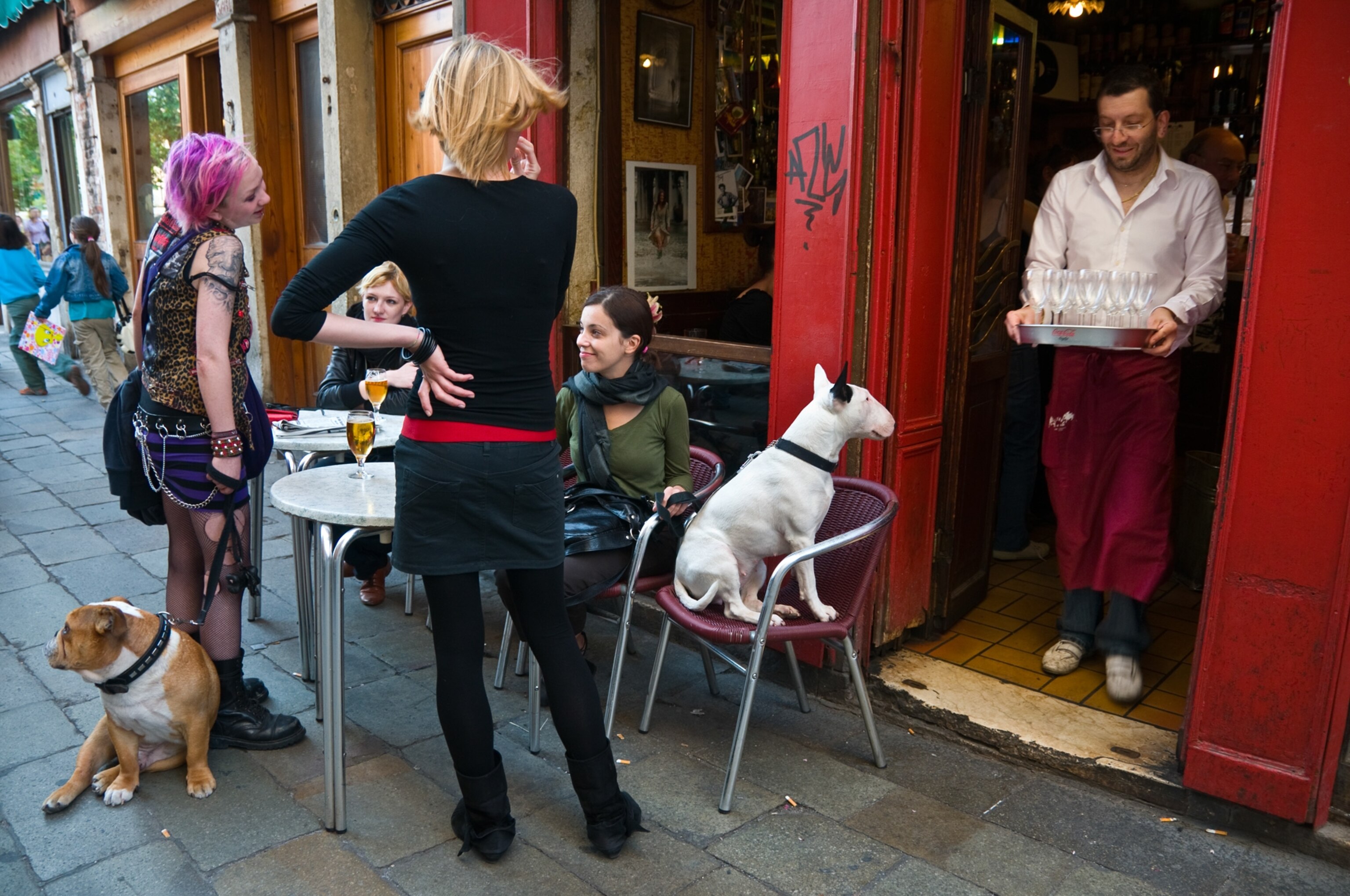
Venetians hate being ignored. Many tourists behave as if no one else exists. Why? Paris belongs to the Parisians, Venice belongs to the Venetians. You're just visiting.
Mass tourism began in the 1960s, and there are plenty of Venetians who remember what life was like when the city was theirs. They remember when there were jobs for everybody—at the Molino Stucky, at Junghans, at the Arsenal, at the piano factory, the brewery, the fireworks factory, the cigarette factory, now all closed.
They remember when there were only five vaporetto stops on the Grand Canal—who needed to go anywhere? The shops were right downstairs. Now there are 18 stops, and if you have to buy something useful, you often have to make a pilgrimage of it.
Save Venice? We Need "Save the Venetians"
Every year the city's population drops by some 1,500. It's fallen now to slightly under 60,000. That's the official number, but it includes the people on Murano, Burano, and the Lido. The population of the historic center itself is 27,000. By now your Venetian has become a critically endangered species no one is making much effort to protect.
"We don't need 'Save Venice,'" quipped Fabio Carrera of the Venice Project Center. "We need 'Save the Venetians.'"
I suppose someone will focus on it when there are only two breeding pairs left.
Venetians love their city. I could argue that they love it more than even the most infatuated visitor. It doesn't mean anything to them to hear it called the most beautiful city in the world. They already know that. But it's more than beautiful to them—it's home.
My Venice is Lino's Venice, made up of people he's always known and things he's always done. We live in one of the few remaining really Venetian neighborhoods, an ordinary part of an extraordinary city, and I'm not saying where it is because I want it to stay this way as long as possible.
In my Venice, we cook Venetian food and celebrate Venetian festivals; we row Venetian boats and we speak Venetian, like everybody else. You could do everything on that list except the language and blend in to a certain extent, but if you live here speaking only Italian, you won't be living here. You won't be able to listen to people talk among themselves, you won't get the jokes and the expressions, and you'll miss the thousand delicious nuances of the slang. I feel sorry for people who don't speak Venetian, because they're missing the soul and spirit and gristle and gizzard of the city.
Venetians Put It This Way
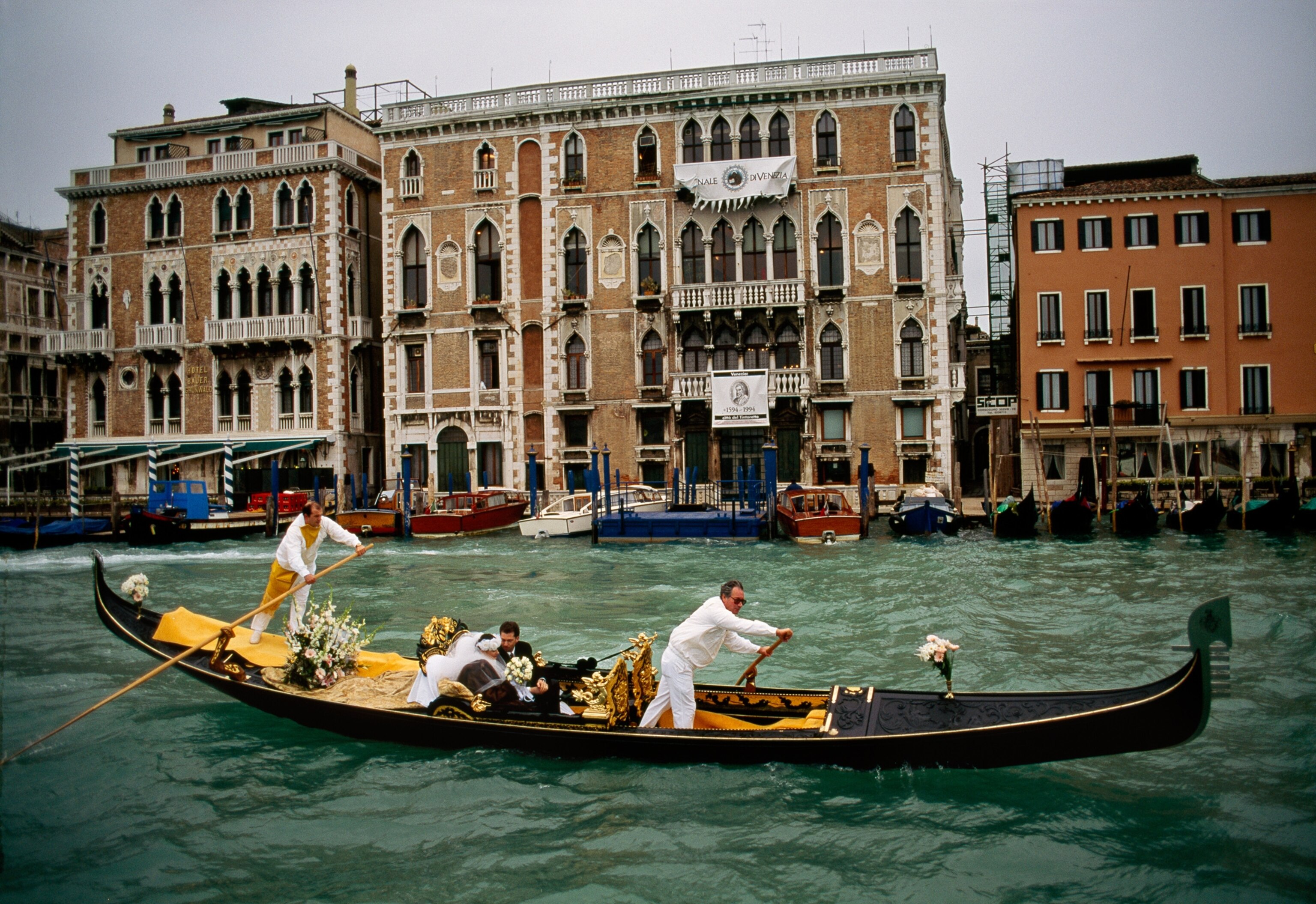
The Venetian language is a rich mixture of Italian, French, Greek, Portuguese, and other linguistic condiments. Venetian proverbs are usually earthy and often merciless.
"We're in polenta." (Things are looking up.) Semo in polenta.
"In this world there are more butts than chairs." In sto mondo ghe xe più culi che careghe.
"He's gone to make clay for ceramics" (majolica bowls, chamber pots, whatever—meaning he died, has become earth again). Xe andà a far tera de bocal.
"You're still back in the time of Marco Caco." (You're totally behind the times, referring to a famous Venetian from a war in 1214.) Ti xe ancora nei tempi di Marco Caco.
"You're pissing outside the chamber pot." (You've missed the point.) Ti pissi fora del bocal.
"To go to the other side of the water" (going to the island of San Michele, the cemetery, meaning you've died) Andar de la de l'acqua.
"He was born in July so as not to pay the midwife." (He's stingy.) Xe nato a lugio per no pagar la comare.
"When the water reaches your ass, everybody learns to swim." Co l'acqua arriva al culo, tuti impara a nuar.
"To weave fog" (to worry about something you probably can't do anything about) Filar caigo.
In our area, most of the men are, or have been, blue-collar workers, and they don't buff their behavior to a high gloss. It's like the East End of London, where the men call each other "love," and the women call each other "girls," the kids scream, and the mothers yell, and the dogs bark, and people either stop to talk or merely exchange cryptic greetings and keep on going.
Lino is baffled by some of these small gatherings. "They just saw each other an hour ago," he'll say. "What could they possibly have to talk about?"
Even though he grew up in a different neighborhood, wherever we go, Lino runs into people he knows from school, from his old parish, the Boy Scouts, his job, and assorted boat clubs, and he also runs into their friends and their relatives and their friends and their relatives.
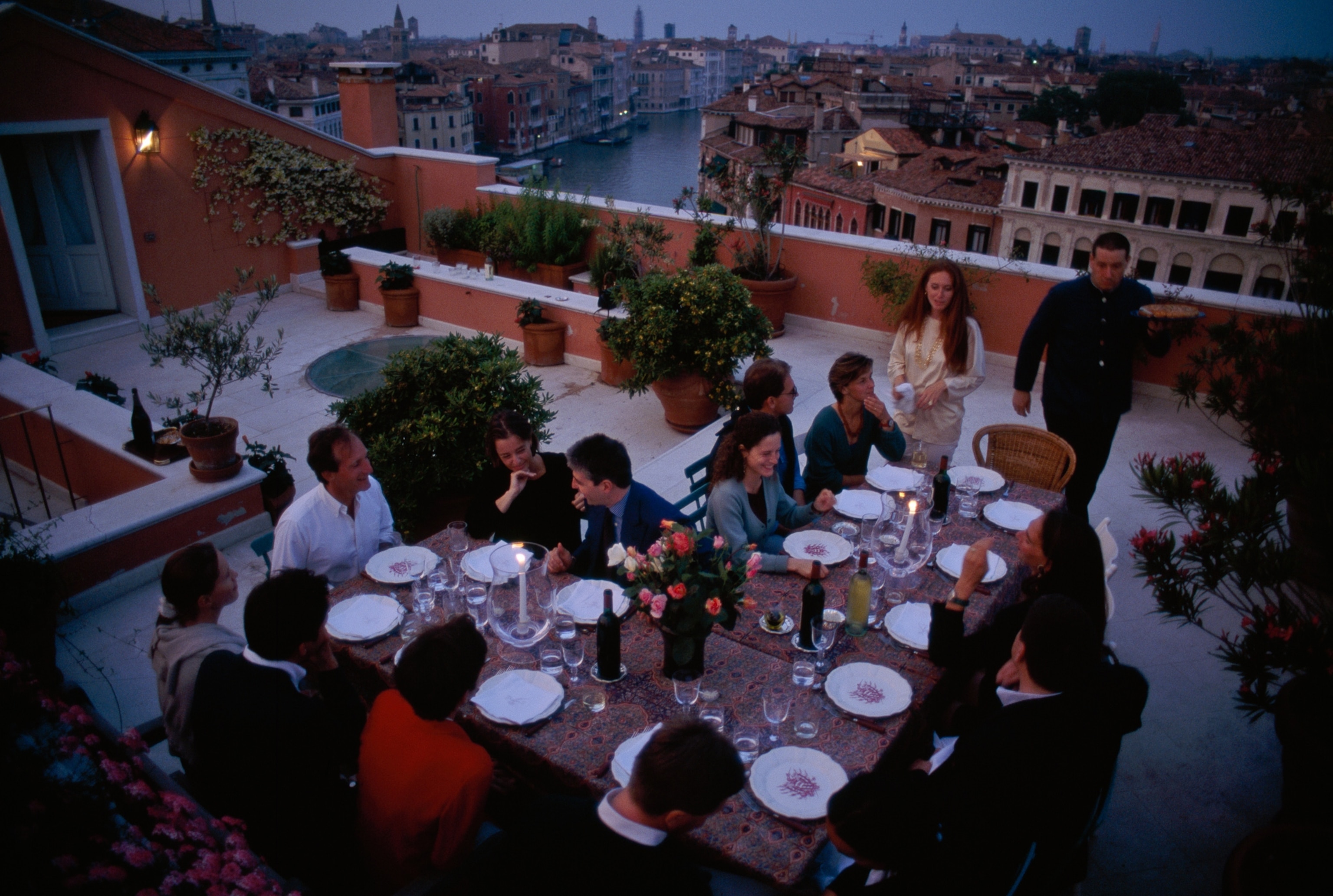
At midnight on the vaporetto, in the morning at the fish market, at any time or place, I'd bet you money that you could pick out somebody at random, and he could tell you something about that person.
"Did you see that lady? You have no idea how beautiful she was when she was young."
"That was my old scoutmaster."
"Her little boy was murdered on a camping trip when an older kid tried to molest him."
"He gave me my first job."
And of course people also run into Lino.
We were on the #1 vaporetto, the trusty local, when a very elderly couple got on. The lady spoke to Lino in a tiny, bent-over voice.
"Lu no xe de la parochia dei Carmini?" ("Aren't you from the parish of the Carmini?") It's really the old-fashioned way, to identify yourself by parish.
"Yes, ma'am."
"Because I'm from the Carmini too," she continued.
"I'm Leda's little brother," he replied. No last name or address needed; in her day there was only one Leda in the parish.
"I thought I recognized you," she said.
I call these encounters "Venetian moments," and in various forms they can happen every day. Even yesterday.
We were walking home and met a friend who lives in another part of town.
Lino made some reference to a nearby family-run bar/café/trattoria. "You think I don't know it?" the friend replied. "I worked for years in this area as a garbage collector.
"That place used to open at 3:30 in the morning for the people who were coming to work—in the bakeries, the butcher shops, and so on—and that's where they'd go to have coffee.
"I'll tell you something else. There was a man nearby—a nice guy, very polite—who was single, lived alone. He'd get up every morning at 3 just to come downstairs and hang out with his friends there. He'd stay till 7:30, just so he could be with people. And if the café didn't open at 3:30, there'd be guys who'd go to the owner's house and throw pebbles against the window to wake him up."
This is the Venice I love, a tightly knotted web of experiences and memories. It's what holds the city together. Venetians don't talk about Titian or the doge of the Fourth Crusade—they talk about each other.
I honestly think that if you know one Venetian, you eventually, even if only by name, know them all. I've been to weddings, I've been to funerals. I came home one afternoon after a series of errands around the city, and it suddenly struck me: "That's strange," I thought. "I didn't see one person I know." That was a milestone.
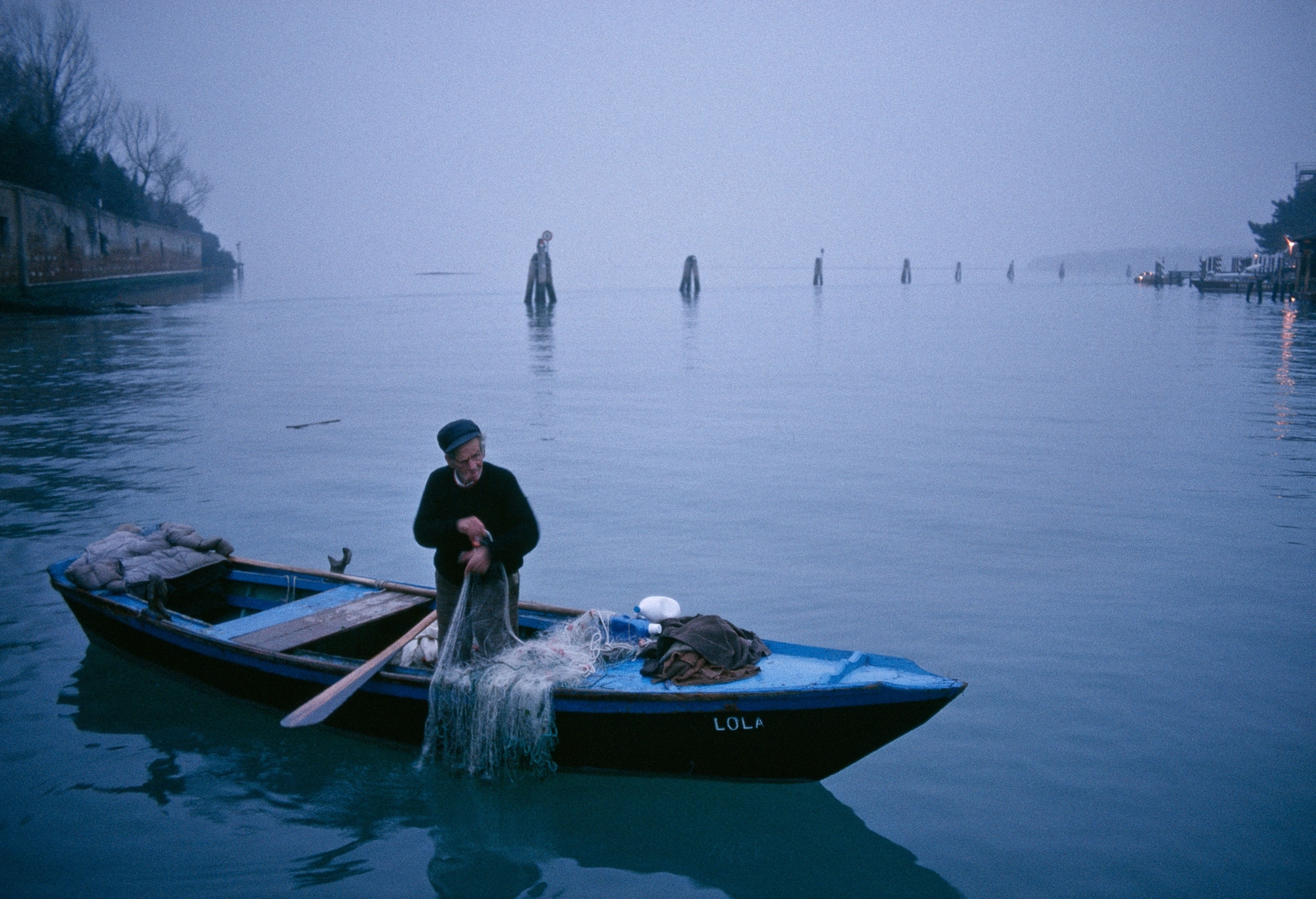
But living in Venice isn't for everybody. It's a vocation, and like most vocations, it requires stamina and conviction, because it takes an astonishingly long time to learn two new languages and the Venetian way of doing everything. I had to redesign almost everything I thought I knew about people and how to live with them, but this small town is huge. In fact, it's more than plenty.
"If it weren't for the bridge to the mainland," somebody joked, "the rest of the world would be completely isolated."
We want to see photos of your town. Using #mytown, submit your images to Your Shot.
Erla Zwingle is an American freelance journalist who has written many articles for National Geographic magazine and who now writes a blog on Venetian life.
A NATIONAL GEOGRAPHIC TRAVEL GUIDE
—Free Things to Do in Venice
—Visiting Charlie Chaplin's Venice
—Venice Must-Dos
—A Photo Tour of Venice's Grand Canal